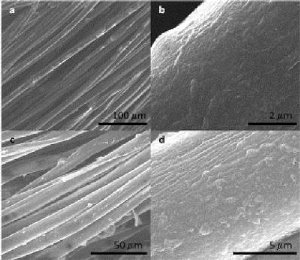Dec 8 2008
Researchers in United States and China are reporting progress toward a simple, low-cost method to make "smart fabrics," electronic textiles capable of detecting diseases, monitoring heart rates, and other vital signs. A report on these straight-out-of-science-fiction-fibers, made of carbon nanotubes, is scheduled for the December 10 issue of ACS' Nano Letters, a monthly publication.
 Researchers have developed a cost-effective procedure of making disease-detecting wearable fabrics, "smart fabrics." Above are microscopic images of the E-fibers. Credit: American Chemical Society
Researchers have developed a cost-effective procedure of making disease-detecting wearable fabrics, "smart fabrics." Above are microscopic images of the E-fibers. Credit: American Chemical Society
In the new study, Nicholas A. Kotov, Chuanlai Xu, and colleagues point out that electronic textiles, or E-textiles, already are a reality. However, the current materials are too bulky, rigid, and complex for practical use. Fabric makers need simpler, more flexible materials to make E-fibers practical for future applications, they say.
The scientists describe development of cotton fibers coated with electrolytes and carbon nanotubes (CNT) - thin filaments 1/50,000 the width of a single human hair. The fibers are soft, flexible, and capable of transmitting electricity when woven into fabrics. In laboratory tests, the researchers showed that the new E-fibers could light up a simple light-emitting diode when connected to a battery. When coated with certain antibodies, the fibers detected the presence of albumin, a key protein in blood - a function that could be used to detect bleeding in wounded soldiers. The fabrics could also help monitor diseases and vital signs, they say. - MTS